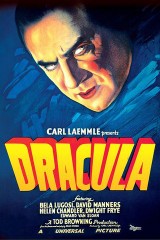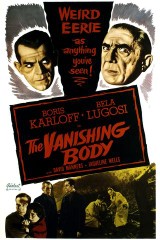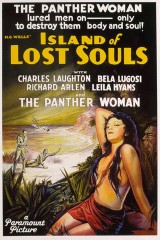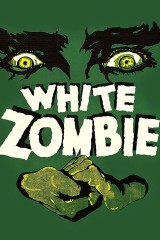
(Photo by Maarten de Boer/Getty Images)
Whether building ridiculously scary worlds like those of The Devil’s Rejects, Lords of Salem, or House of 1000 Corpses; imaginatively reinventing a classic franchise like Halloween; or creating twisted metal anthems like “Living Dead Girl,” “Dragula,” and “Sick Bubblegum,” Rob Zombie is one intense fellow. The man must be plagued by nightmares of psychos, demons, and the undead in between all the stage-shows, silver screens, and musical trappings, because he never seems to sleep.
Currently, he’s hosting Rob Zombie‘s 13 Nights of Halloween on HDNET Movies, and the scheduled selections are disturbing — check out Kalifornia, True Romance, Sometimes they Come Back and Leatherface: The Texas Chainsaw Massacre III, all of which air between now and its final night on Halloween. Is it any surprise that each of his Five Favorite Horror Films feature seductive creeps played by Bela Lugosi? Granted, it wasn’t easy for Zombie to settle on his all-time faves (you can see his favorite all-time films of any genre here), but he’s been on a 1930s horror kick of late and was eager to elaborate on some of the best ones of the era.

I could go on forever with the list, so I just picked five random ones, because I go through periods where I watch certain movies a lot. I don’t know why — I’ll get on a kick. I’ve been on a kick lately of watching Dracula, the 1931 version with Bela Lugosi, over and over and over and over. You know?
I love everything from the ’30s. The 1930s is my absolute favorite time period for horror movies, because they were just so demented and sick. Sometimes you watch them and go, “Wow, they get away with a lot.” Then, of course, the codes came in and it ruined the party. When you watch movies from the 1940s, they seem so tame and so dry, but everything from the ’30s is just amazing.
Lugosi in that film is so iconic, he doesn’t even seem like an actor giving a performance. Some of these people transcend to something else. It’s like Marilyn Monroe or something. They became something else. Sometimes people will make fun of his performance because of his accent, but he’s so… It’s so funny. I love watching him, because his performances are so unique. Sometimes there’s other people in the film — like David Manners, who’s like the lead, good-looking guy, and he’s so wooden and so 1930s-stiff acting, and Lugosi seems like Brando. You can see he’s so in it that when they yelled, “Cut!,” he didn’t cut. You can just see it. He’s so committed that his performance is funny, because it’s on such another level from anyone else in the film. Everybody in those movies back then, you watch them and it’s just — it’s that feeling like, “Eh, you know, even though they’re supposed to be boyfriend/girlfriend, husband/wife, they don’t [seem] like they’re having sex or something.” Lugosi seems like he wants to f— everything in the movie constantly. He just has that vibe. Really weird, man. You know?
He does, essentially, I guess.
Yeah, he does. He’s just not tame. I don’t know, maybe because he was Hungarian or whatever, he just has a different way of approaching, but he does not have that “uptight American actor from the ’30s” vibe at all. He just steals every moment. Not just him; Dwight Frye as Renfield is amazing. It’s funny — actors seem like they don’t want to do these types of movies, but as soon as you play a villain in something that’s like a horror movie, that’s what you’re going to be remembered for. Even if Anthony Hopkins won an Oscar for whatever — Remains of the Day or Howard’s End or I can’t even remember what it was — he’s Hannibal Lecter. Doesn’t matter if Jack Nicholson won an Oscar for Cuckoo’s Nest or whatever; he’s Jack Torrance. It’s so funny, these roles are just so — they stick.

Lugosi’s my favorite. I think he’s in almost every movie I picked here.I didn’t even realize it till I did my list and it’s like, “Oh, s—, He’s in every movie I picked.” Another one is Murders in the Rue Morgue. 1932 again, with Lugosi as Dr. Mirakle, who’s desperately trying to mate a woman with a gorilla. Again, you watch — basically, he wants the gorilla to have sex with this woman, and they’re sort of dancing around the topic the whole time. He’s mixing their blood, and when he’s done with the ones that failed, he just dumps them in the river. It’s pretty f—ed up. Again the male leads seem completely… Oh, they’re from “blah blah blah” acting, and Lugosi is so bizarre and incredible, as always.
Do you think they intentionally told the rest of the cast to keep it kind of mellow so he could upstage them?
I don’t think so. I think he was just on another vibe. They were all like, “We’re in a movie and we’re acting,” and he’s like, “I am Dracula.” It’s funny — I always talk about Brando, like I said before, bringing in that new style of acting, but I don’t know. When you want Lugosi, he sort of was like… He was already there, man.

I would say my third one would probably be The Black Cat, 1934. Lugosi, but with Karloff, who also is demented, as a Satan worshiper. David Manners, who is in Dracula, again giving another bizarre, stiff, wooden performance, except this time it’s more obvious, because you have two guys who are amazing surrounding him. It’s always weird watching these sort of straight-up leading men being destroyed by these freaks. I don’t know, it’s kind of weird. I guess these guys don’t really get the credit that they deserve for their acting, because they were always in horror movies, but Lugosi and Karloff are just incredible. I mean, they create these iconic moments that define what cinema is, and they’re sort of brushed off. But I guess that’s the way it goes.
And I’m sure they had no idea their images would become so legendary for decades to come.
No, I’m sure once they shot these movies, they thought, “Oh, who’s going to remember this next year?” No one thought they’d be watching these movies over and over. That why, when that Shock Theater popped up on TV in the — what is it, the late ’50s or whatever? And people started rewatching these movies on TV, and they found a whole new audience, people were shocked. They’re like, “Who cares? These movies are old.” It’s so bizarre.
People don’t give enough credit to how twisted they really were. You can watch them now, and they stand up.
They totally do, because what happened was like, you can see the cycle. In the 1930s, they’re incredible. They’re like A-level movies for Universal or MGM or whatever. They’re really dark. They’re really adult, too. 1940, the codes come in, everything gets a little bit more whitewashed. It becomes like House of Frankenstein, and there’s a lot of monsters, and you can see it’s more aimed for kids. Then the next step of degradation was they have to meet Abbott and Costello. By that point, it’s just complete buffoonery. Maybe it’s like a 10-year gap or something. But if you watch Dracula and then you watch Lugosi in Abbott and Costello Meet Frankenstein, you’re like, “Wow, it’s so weird to watch …” It’s like watching Jack Nicholson pop up in an Adam Sandler movie, but playing the character from The Shining, and you go, “What? Really? We’re doing this?”
I love those movies, too, because they’re so bizarre, but it’s so funny, because that’s, I think, what people think of, because they’re so childish. The ones from the ’30s are definitely not childish. Especially Frankenstein. When you watch it, I mean we’re not really talking about that one, but some stuff is… These are such early films, people must have been so disturbed. There’s not a lot of music. Especially Dracula has, like, no music, so the sounds of people screaming or whatever’s happening just seems so real. I can’t imagine what people were thinking, because movies had just come out of the silent era, practically, so it’s pretty crazy.
You know, we can talk about degradation back then, but today too — the first Elm Street movie was such a classic, and then Freddy almost became like Mickey Mouse.
That always happens, yeah. I used to always say that — that Freddy Krueger and stuff, he was scary, and then they’re like, “Oh, his catchphrases get a big reaction. More catchphrases.” Then there’s a line of toys. I used to think it was funny when you’d see a five-year-old dressing up as Freddy Krueger. Your five-year-old’s dressing up essentially as a child-murdering pedophile? Okay, that’s a good costume. Yeah, they always become lovable after a while. It just happens.
Pretty disturbing in itself.
That’s just the way life goes [laughs].

Yeah, and The Island of Lost Souls is amazing, from 1932 with Charles Laughton as Dr. Moreau. That movie is amazing. That movie’s dark. For anyone who hasn’t seen it, the extras — I mean, even now you watch like, this is really disturbing. The extras are supposed to be the half-man/half-animal people. You can tell they got really bizarre-looking extras before they did the makeup, and everybody looks like they’re deformed and f—ed up. Again, Lugosi plays the leader of the beast men. He’s not in it a lot, but of course he has the line that everybody remembers about the House of Pain: “He who breaks the law goes back to the House of Pain.” He’s in the movie for five minutes and steals the movie. Charles Laughton is incredible. But it’s demented again. The basic premise is a crazy one. They have the beast men and they’re being operated on and just screaming. It’s like, “This is not fun.” You have little kids running out of the theater in tears, or adults. It’s amazing. Still amazing. The cinematography’s amazing. Everything about it is just incredible.

The last one I picked was another Lugosi film, so yeah, he is in every film I picked. That’s funny. I didn’t even realize it. It’s White Zombie from ’32, which is shortly after Dracula. It’s an amazing movie. I’m pretty sure it’s the first movie to ever use the word “zombie” — to use that in a movie. It takes place in Haiti, and Lugosi runs this sugar mill and the zombies are his workers and stuff. Again, he’s amazing, but the film is — only really bad versions of it existed for so long, so every time you’d watch it, you go like, “Wow, the quality of this movie is horrible. It looks like a cheap movie.” Then later, when people have restored things and find them, it’s a really incredible-looking movie. Again, it seems very primitive, but it looks amazing, and he’s great as always. If you watch some of the leads and you just watch their scenes, you go, “What is this, like a cute little musical comedy?” Then he comes in. Again, not f—ing around.
I know a certain rock star that named his band after the movie.
Yeah, I love that movie so much, and I always thought, “What a great name for a band.” I thought that way before I ever had a band. I go, “If I ever had a band, that would be the name.”
Kerr Lordygan for Rotten Tomatoes: Last we spoke I think you mentioned how movies were your first love, even over music. Is that right?
Rob Zombie: Yeah, I mean, I loved everything to death, but I think I probably discovered movies first as a kid before I really discovered music. You’d watch King Kong or Godzilla or Planet of the Apes or whatever. Then you get a little older. I mean, still real young. Then you discover the radio and, oh, the songs and the music, but they were sort of indistinguishable for me. I always wanted to do movies, but it just didn’t seem possible. Starting a band, you can get a couple other goofballs together and buy some cheapo equipment. You go, “Hey, we’re a band.” Back in the day of owning camera equipment, buying film and editing stuff, it’s just like, “Who’s making movies? I don’t know. That’s like for the special people.” Now, you can make a movie with your phone, so it doesn’t seem so mysterious, but back in the ’70s, it seemed virtually impossible to do such a thing.
RT: You brought that horror movie inspiration to your stage show. Your huge stage show is a horror film.
Zombie: Oh yeah, totally. Yeah, everything was always linked in my mind, and it still is. When I’m making a record or making a movie or making music videos or designing a stage show, it’s one giant project for me. One thing just informs the other constantly.
RT: A lot of horror fans now would also consider some of your films in their top five, so I’m wondering, do you have a favorite of your own films, or one that was most fun to make?
Zombie: Well, the one that was the most fun to make was Devil’s Rejects. That was the most fun to make. The first film, House of 1000 Corpses, was — on your first film, that was film school, one crash course in filmmaking. That was stressful and crazy, and you don’t know what you’re doing, and you’re learning as you’re going, blah blah blah. By the time I got to my second film, I had it dialed in. You’re always dialing it in, but dialed in more so. Everything was great. The crew, the actors, the studio, it was just great. Really, ever since then, it’s like I’ve been chasing that high. Each film gets more and more difficult. Some of them have been just downright miserable to make. I hate to say that, because I love movies and I love making them, but the two Halloween films I made, those were the most miserable experiences of my life, making those films.

Rob Zombie on the set of House of 1000 Corpses (Photo by Lionsgate courtesy Everett Collection)
RT: You can’t look at them fondly now at all?
Zombie: I start to forget. Yeah, I totally start to forget. I could watch a movie and go, “Oh, well,” because — you can be miserable while you’re doing something and the end product can still — you can still go, “Oh, but it turned out fine.” But as far as looking back, it’s like, “That was good times.” Yeah, definitely not. In that way, I don’t think it was [a good time] for anybody. The situations, without going into it, were miserable. But it’s always something. We have short memories, so it’s like a goldfish. I’m like, “I’m never making another movie.” Then I swim to the other side of the bowl and go, “Let’s make another movie.” You know? I totally forget. I do forget, because I’ll run into somebody who worked on one of those movies and go, “Hey, remember that thing?” And I’m like, “Holy s—, I forgot all about that.” Some f—ed up thing that happened.
RT: What’s next? You have something in the works?
Zombie: Well, I’m in the studio right now making a record. I haven’t made a record in a while so excited to do that.
RT: When can we hear that, do you think?
Zombie: I don’t know. The way I do things now is I may not even finish the record before I start another movie, and I may come back and finish the record after the movie, or I may end up back on tour. It’s kind of a different world. It used to be a real world of: you stopped, made a record, and then you did this album cycle for the record. It doesn’t really work like that anymore, you know? It’s sort of like you have to be doing everything all the time or the world forgets you’re alive.
RT: Yeah. With social media and everything, it seems like you always have to have a presence, too. That’s got to be a challenge.
Zombie: It is kind of weird. Social media adds to it, but you saw it coming maybe 10 years ago or something. Now it’s like, Jennifer Lopez was an actor, then she’s a pop star, and then she’s hosting American Idol. Or Will Smith. If you go, “I’m an actor,” it’s like, “What else you got?” “I’m a singer.” “What else you got?” I can’t believe how many people I turn on the TV and go, “You already have a hit show. Why are you now hosting a game show?” I thought hosting a game show was the booby prize when your career went to s—? Now when you have a number one show, you still host game shows? I’m confused.

Rob Zombie on the set of The Devil’s Rejects (Photo by Lionsgate courtesy Everett Collection)
RT: Like the Gene Simmons philosophy of, “All of it. Now.”
Zombie: Yeah, I guess so. I get it. I have a side of my personality that would do that, too, but at a certain point, I go, “Okay, I got to dial it back,” because I want to make sure when I’m doing something, I have the time and the care to put into it and it’s not just like, “Let’s get this done and move on to the next thing.”
RT: You want it to be quality.
Zombie: It’s real easy to fall into that trap. Yeah, and quality takes time. It’s not just like, “Oh, we’re going to go and s— this out, then go over there and s— that out.”
RT: Do you ever sleep? It sounds like you don’t sleep.
Zombie: Usually, I do, but I fall asleep thinking about everything, and I get up in the morning, I’m like, “Oh, yeah, go do that thing.” That’s kind of why I like going on tour, because when you’re on tour, you kind of can just only be on tour. It’s kind of a vacation. Playlist goes in, the rest of the work has to wait until you get home.
Catch Rob Zombie’s 13 Nights of Halloween on HDNET Movies now. You can see the remaining schedule here.